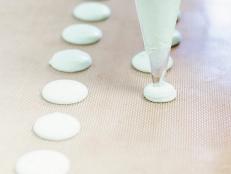Do I Really Have to Do That? Recipe Steps You Might Be Able to Skip
The perfect guide for lazy days and a lack of foresight.

Getty Images
I think we’ve all been there. We’re super excited to make a recipe and then tragedy strikes – there was a pre-recipe task that didn’t get done, or worse: a mid-recipe, eight hour waiting period. Maybe it was softening butter, or perhaps you forgot to let your chicken marinate for a few hours. Either way, my first reaction is always to panic.
But honestly? Sometimes you don’t have to. While it’s true that good things come to those who wait, sometimes we’re not always looking for perfection. We all just want our food, and fast. So it’s natural to wonder – do I really need to do that?
As a diligent recipe tester and former bread baker, I recognize that a lot of cooking and baking is a chain of scientific reactions, some needing to fire off more precisely than others. However, I’ve found that a lot of times, there’s still hope you’ll wind up with a still-delicious result if you don’t do everything perfectly.
Here, I break down how important some of those steps actually are, and how they might affect your end product.

Getty Images
Do You Really Need to Soften Butter?
Most of the time a recipe calls for softened butter, you’re probably making something sweet. If you want an ethereal and light buttercream or a cake that has amazing lift, softened butter is going to be one of the first things you need to get started. However, I don’t have the planning skills for that, so truly room temperature butter remains my white whale.
Technically, when you’re baking something like a cake, the end goal is to make a fully emulsified batter, free of lumps, and cold butter can get in the way of that. A lot of times, that creaming stage is a critical step in building structure in your cake. Solid lumps of butter in a batter that didn’t have enough air beat into them can make for a denser cake or even cause tunneling. Room temperature butter will be a lot easier to whip up into a light and fluffy texture without any coarse solid bits that interfere with the structure of your cake or smoothness of your buttercream.
Another time you might need some softened butter is when you’re making compound butter. I really love making a decadent compound butter with anchovies, garlic, parsley and Parmesan whenever I have any really good bread, but trying to incorporate those ingredients into even slightly-hard butter can cause headaches.
Shortcut Solutions: Most of the time, I’ll microwave the butter until it’s just soft enough, but I’m almost always stuck with a hunk of butter that got a little … melted (which definitely isn’t great for baking, but works fine for any compound butter).
Lately, when I’m baking, I’ve simply been cutting my fridge-cold butter into one-inch cubes and beating it with sugar in an electric mixer until it’s soft and a little fluffy. I find that the friction from the beater and the sugar is able to warm and soften the butter on its own – though I have to scrape down the sides of the bowl and beater often in the early stages in order to really get it going, and I have to spend a little extra time creaming the butter. But: all my baked goods have been coming out wonderfully.
However, if you’d still rather have truly softened butter, you can try thinly slicing your stick of butter before going to measure out anything else in the recipe. When the butter is in super-thin slices rather than a large log, it softens much quicker at room temperature and will be perfect for whipping air into a cake batter or fluffy buttercream.
Regardless of whether you’re looking for a beautiful cake with perfect structure or a simple compound butter, there are plenty of solutions if, like me, you didn’t leave the butter out.

Elizaveta Elesina/Getty
Do You Really Need To Bring Your Eggs to Room Temperature?
If I can’t remember to soften butter, I think it’s a given that I lack the foresight to leave my eggs out to come up to room temperature.
The only time a recipe will really encourage you to use room temperature eggs is when you’re baking. Remember how we talked about how we want to make a well emulsified batter to make a cake? Well, eggs are crucial to this step as well. When you’re putting together a bake, you theoretically want all of your ingredients at the same temperature, unless otherwise stated, so that they can evenly incorporate into the batter. Cold eggs, and also cold milk, can cause the butter in the batter or dough to cease up, forming distinguishable lumps of butter throughout. Once again, these bits of butter in the curdled batter can make for a lumpy mixture in addition to a denser cake with the possibility of tunneling.
Shortcut Solution: If you’re not aiming for perfection, throw the eggs into the batter and call it a day. In most cases, it’ll be fine. However, if you want added insurance, you can quickly bring your eggs to room temperature with some water. If you place your eggs in a bowl of warm water for a few minutes, they’ll quickly come up to room temperature.

Getty Images
Do You Really Need to Marinate Meat For That Long?
One of my many recurring living nightmares is when I’m making any kind of meat (usually chicken), and the recipe asks me to marinate it for four hours or, for the truly diligent, overnight. I’m usually encountering these kinds of recipes when I’m already starving, so waiting hours on end simply does not work for me.
Marinades are highly flavorful liquids that are mixtures of salt, sugar, acid and all kinds of other ingredients that pack a punch like herbs and spices. Generally when marinating, the goal is not to get flavor all the way through to the center of your cut of meat, but rather to prime the exterior with tons of flavor. The salt will help season the meat throughout and will continue to build flavor over time, but most of the flavor intensity will come from browning and cooking the sugars on the outside of the meat.
Shortcut Solution: There are some meal preppers out there who may suggest just front loading this process – marinate your meat at the beginning of the week so flavors have already been imparted whenever you’re ready to cook, but keep in mind: you can overdo it.
Because of the presence of acid, marinating your meat for too long can actually degrade it. In most cases, letting proteins marinate for more than 24 hours can lead to a drastic change in texture rendering the meat tough, dry or even mushy. Additionally, allowing meat to sit in liquid for prolonged periods can encourage dangerous bacteria to grow that can lead to foodborne illness.
Marinating your proteins for even just 30 minutes can make a world of a difference. Oftentimes you’ll still be getting some of the salt permeating through the meat, and the exterior will latch onto whatever ingredients you added to intensify the flavor, leading to some extra delicious browning.

Getty Images
Do You Really Need to Soak Beans (and Other Legumes)?
To soak or not to soak? Truly, an age old debate.
There are some recipes where soaking the legume is a non-negotiable step. For instance, when you’re making a fritter like falafel, you can’t just use a pre-cooked, canned chickpea because it will be far too mushy; dry ones will crumble into a powder, rather than make a coarse meal – an outcome you can only achieve with supple, soaked chickpeas.
Boiling beans in a soup or a stew is a different story, and is more a matter of taste – and time.
Some experts (including the USDA) say that soaking your beans helps make them less gassy. This is because beans are full of sugars called oligosaccharides that are difficult for our bodies to digest. When you soak your beans, they release a lot of these sugars into the water, so when you discard the bean soaking liquid, you’re also getting rid of a lot of these harder to digest oligosaccharides. Some people recommend adding baking soda to your pot of boiling beans to help prevent any gassiness, but the reviews are mixed about whether or not this actually helps.
The Verdict: Personally, I don’t see the need to soak if you’re simmering them and making a big pot of brothy beans. When I’m cooking a bean from its dried state, I already know I have to invest at least a couple hours before enjoying them, so what’s tacking on another? Besides, if you’re just soaking your beans in regular unsalted water overnight, sure, they’re going to plump up and have a shorter cooking time, but they’ll also have taken on a lot of water instead of the super flavorful cooking liquid.
So don’t worry if you’re looking to stew your beans for a couple hours. It’s definitely not the end of the world if you forgot to soak them. You might just have to wait a little longer for a big pot of brothy beans, and they might make for a gassier night with all those oligosaccharides. However, if you’re transforming your legumes in a completely different way, you won’t be able to achieve the proper texture without a properly waterlogged bean.
Related Content:
































